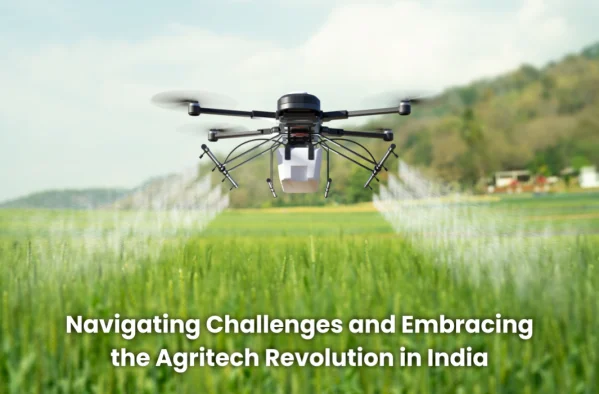The era of Agritech: How India will become a major farming ecosystem
December 2, 2024

When India emerged as an independent nation 76 years ago, agriculture was the engine propelling the economy, contributing more than half of the nation’s GDP. Today, India proudly retains its stature as one of the world’s largest and most diverse food producers. Agriculture, the source of more than 20 per cent of India’s income, continues to hold a central role in the nation’s economic landscape.
By 2030, the agricultural sector has the potential to orchestrate an awe-inspiring 50 per cent increase in India’s GDP, soaring to an impressive $600 billion. This sector is not merely a statistical powerhouse but also a promise of enhanced prosperity for the farmers who have been its bedrock for generations.
Yet, as the sun rises on this potential, it casts a revealing light on the challenges that threaten to obscure this promising future.
Chief among these challenges is the nation’s delayed adoption of agricultural technology, commonly referred to as agritech. This delay, places India at a substantial disadvantage compared to more technologically advanced counterparts. In the present era, Indian farmers grapple with a considerable setback - half of them lack access to basic farming equipment, a fundamental necessity in the modern agricultural landscape. Most farms, in turn, remain highly susceptible to crop damage from pests and the unpredictable vagaries of weather conditions. This vulnerability jeopardizes the livelihoods of countless farmers. Adding to these challenges, a staggering 50 per cent of India’s farmers face difficulties in securing traditional financing, often subject to exorbitant interest rates that exceed market standards by 10 to 25 per cent.
In light of these challenges, the importance of integrating agritech into India’s agriculture sector becomes evident. Agritech promises to not only mitigate these challenges but also to reshape the future of farming in India, empowering farmers, increasing efficiency, and establishing India as a global agricultural powerhouse.
Efficient Resource Utilization
Digital technologies, particularly drones, tractors, and water pumps, hold the promise of revolutionizing farming practices when programmed for coordinated responses. Drone adoption, for instance, goes beyond being a buzzword; it significantly enhances the effectiveness of agricultural inputs, optimizing the use of resources and reducing wastage. By monitoring crops from the air, drones can identify areas that require specific attention, such as pest infestations or signs of stress. This precision minimizes the need for excessive pesticide application and allows for targeted treatment.
Moreover, agritech-driven applications are increasingly providing personalized crop calendars and a wealth of information on various facets of farming, from crop sowing and land preparation to pest management. Farmers now have access to data-driven insights and recommendations that assist in making informed decisions regarding crop planning, fertilization, seed treatment, and irrigation. This empowerment equips farmers with not just knowledge but practical tools that contribute to more efficient, sustainable, and profitable agriculture.
Guidance and Timely Alerts
Agritech plays a pivotal role in ensuring that farmers make well-informed choices, particularly in terms of crop diversification and weather management. Government subsidies and procurement practices have historically influenced crop choices. However, agritech offers a transformative solution that empowers farmers to diversify into crops that are less vulnerable to the unpredictability of nature, while also being profitable and environmentally friendly.
Moreover, the timely delivery of weather alerts through some of the upcoming agritech platforms proving to be a game-changer. Farmers who receive real-time weather updates can take immediate actions to protect their crops, ensuring higher productivity and more robust farm income. Meanwhile other startups are developing AI-driven tools that provide farmers with instant access to comprehensive farm records. These records include ownership details, land structures, crop patterns, benefits availed through government schemes, and mechanization status, all in a matter of seconds.
Better Scientific Inputs
Agritech excels at providing precise and timely advice to farmers, a crucial element in modernizing India’s agriculture. Data-driven platforms offer farmers the ability to enhance their yields by providing tailored information and input planning services. Farmers can seek consultations on chemical dosage, monitor crop health, and make informed decisions regarding input usage. Agritech apps also facilitate the seamless purchase of inputs and the sale of outputs, offering invaluable agronomy advice and technology for precision agriculture.
A Bright Future for Agritech in India
The transformation in India’s food and agriculture sector is slowly shifting from traditional methods to advanced agri-tech services and new food products. While digital technologies have already revolutionized various sectors, agriculture is the next frontier. The impact of technology in agriculture has the potential to be massive, with projections indicating that the agri-tech sector could reach a valuation of $24 billion by 2025. Although technological interventions are already changing the landscape, there is still much untapped potential.
In conclusion, the era of agritech in India holds the promise of revolutionizing farming practices and elevating the nation to the status of a farming powerhouse.
